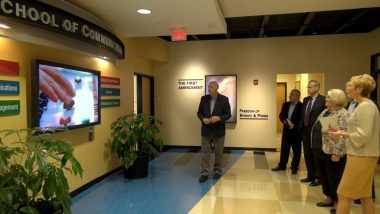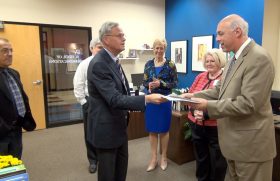A team representing the Accrediting Council on Education in Journalism and Mass Communications (ACEJMC) has recommended full reaccreditation for the School of Communications.

The team also found the M.A. in Interactive Media program in compliance on all standards and recommends full accreditation. The graduate program began in 2009.
The report refers to the growth in the School’s quality and quantity as “nothing short of spectacular,” citing talented faculty, enthusiastic students and an innovative leadership team as keys to building “a positive educational environment … with an exemplary culture of collegiality.”
In 2005-06, Elon became one of 18 private universities with an accredited communications school, along with Columbia, Syracuse, Northwestern, Miami, Southern California and Pontificia Universidad Catolica de Chile. In all, 112 colleges and universities in the world have an accredited communications program. ACEJMC has a six-year renewal cycle.
The accreditation team presented its 49-page report to President Leo M. Lambert and Provost Steven House at the conclusion of its Oct. 9-12 site visit to Elon. The Accrediting Council will formally vote on the recommendations in April 2012.
The chair of Elon’s site team was Dr. Douglas Anderson, dean of the College of Communications at Penn State. Team members were Barbara Hines of Howard University, Marie Hardin of Penn State, Portland Oregonian editor Peter Bhatia and Raul Ramirez, executive director of news and public affairs for KQED Public Radio in San Francisco.
Preceding the team visit, the School prepared a 500-page self study that analyzed the program in the nine standards: mission and governance, curriculum and instruction, diversity, faculty, scholarship, student services, resources and facilities, public and professional service, and assessment of student learning. The team praised the School’s self study as “candid, thorough, contextual, clearly written, well edited, well organized, complete in virtually all respects.”

The ACEJMC report listed three programmatic challenges for the School: a need for enhanced fundraising with appropriate university support, a need for more Communications Fellows scholarships and a need to keep emphasizing the teaching of applications over software.
In terms of strengths, the national team listed these 12 in the words below:
- Focused mission and positive educational environment built upon mutual faculty-student respect and high expectations.
- Exemplary culture of collegiality and esprit de corps that permeates the faculty and staff.
- An admired dean whose personal and professional traits – and operating style – evoke an uncommonly high level of respect and loyalty from faculty and staff.
- Innovative, stable, effective and unselfish leadership team that sets the tone for the can-do spirit that envelopes the program.
- Talented, hard-working faculty members who are dedicated to preparing students for communications positions and to be contributing members of society.
- Loyal faculty, staff and administrators who are admired across the campus for being engaged and positive university citizens.
- Impressive articulate, enthusiastic and civil students who are proud of the education they receive and who appreciate the environment in which they live, work and study.
- Enviable support – verbal and financial – from the central administration.
- Well-designed, well-kept, clean and airy facilities.
- Thoughtful assessment plan that ensures curricular nimbleness and programmatic evolution that has been cited as a model by ACEJMC.
- Broad-based scholarly and creative productivity by a faculty whose primary mission is teaching.
- Strong and caring academic advising by faculty, complemented by impressively dedicated staff-run internship and career services programs.
For the graduate program, the report listed two challenges: a need to define all of ACEJMC’s values and competencies in curriculum and instruction and a need to focus on diversity at the graduate level as the School already does at the undergraduate level.
In terms of graduate program strengths, the team listed these five in the words below:
- Dedicated facilities and coursework for graduate students; the master’s program is not an “afterthought” or simply an add-on to the undergraduate programs.
- Energetic, qualified faculty, impressive facilities, up-to-date equipment and technology.
- A nimble, flexible curriculum.
- A strong built-in public-service component.
- Strong, systematic support for students in job placement after graduation.


